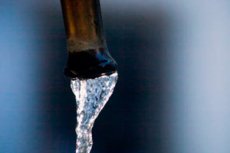New publications
Is hard water harmful? Pros and cons
Last reviewed: 02.07.2025

All iLive content is medically reviewed or fact checked to ensure as much factual accuracy as possible.
We have strict sourcing guidelines and only link to reputable media sites, academic research institutions and, whenever possible, medically peer reviewed studies. Note that the numbers in parentheses ([1], [2], etc.) are clickable links to these studies.
If you feel that any of our content is inaccurate, out-of-date, or otherwise questionable, please select it and press Ctrl + Enter.

When you turn on the tap to get a glass of water or wash your face, you probably don’t think about what’s in your water other than the water itself. Depending on where you live and whether you have a water softener, your water may contain dissolved minerals like calcium and magnesium. And these minerals can play a role in whether certain contaminants, like lead, stay out of your water.
The more dissolved minerals, the "harder" your water. But is hard water really good or bad for you?
As engineering researchers studying water quality, we have seen both the positive and negative effects that soft and hard water can have on everything from plumbing systems to the human body.
What is hard water? Hard water is water that contains dissolved minerals such as calcium, magnesium, iron, and manganese. Soft water contains lower concentrations of these minerals.
Hardness is measured in terms of calcium carbonate, CaCO₃, which is used as a baseline for comparing different minerals.
The amount of these minerals in a city's water supply varies by region, depending on both the source of the water and how the water is treated.
Communities that get their water from wells rather than surface water bodies like lakes, streams, rivers, and reservoirs often deal with hard water before treatment. As groundwater moves through the soil to the well, it absorbs minerals. At the same time, in areas where rock types and sediments are more susceptible to dissolving into the water, the water may be harder.
Impact on water pipes and distribution systems
Water that is too hard or too soft can damage pipes and cause health and aesthetic problems.
Because hard water has a higher concentration of minerals, minerals can build up in pipes, causing clogs in homes and public water systems. Hardness also creates more deposits at higher temperatures, so water heaters are susceptible to mineral buildup. In areas with hard water, water heaters have a shorter lifespan.
But hard water can be good for you. While the minerals in hard water can clog your pipes, the thin layer of mineral deposits in your water lines can protect you from consuming toxins that may leak from the pipe itself. Mineral-free water can cause your pipes to corrode because without the thin protective layer of minerals, the water can begin to corrode your pipes, releasing metals from the pipes into your water. Drinking this water can mean consuming metals like lead, copper, and iron.
While water that is too soft or too hard can affect water lines differently, there are other chemical processes besides hardness that play a role in pipe corrosion and clogging. Therefore, there is no specific level of hardness that is a cause for concern. Water utilities take appropriate measures to adjust water hardness levels.
Effect on skin and hair
Using hard or soft water to wash your face can also have a noticeable impact on your skin and hair.
Hard water is more likely to dry out your skin. The minerals in hard water strip your skin of moisture and create deposits that clog your pores.
Hard water can also strip your hair of moisture, leaving it dry and rough. Dry hair is more prone to frizz, tangling, and breakage. Mineral deposits can also build up on your hair and scalp, clogging hair follicles and leading to dandruff and slow hair growth.
Many households have their own water softening systems. A water softening system can help with dry hair and skin and prevent scale buildup. However, many of these systems replace calcium and magnesium with sodium, a mineral that does not contribute to water hardness, to reduce overall hardness. The increased sodium content in water can be a problem for people on a low-salt diet.
General Health Benefits
Aside from the aesthetic and water heating issues, drinking hard water is actually good for you and has no serious side effects.
For example, the extra magnesium and calcium you consume through hard water can be a gentle solution to digestive problems and constipation.
Additionally, studies have shown a positive correlation between drinking water hardness and bone health. Because calcium is an important mineral in bones, people in areas with drinking water that contains more calcium may have higher bone density and be less prone to osteoporosis.
Researchers also found that drinking hard water was associated with a reduction in deaths from cardiovascular disease. Magnesium helps regulate heart muscles, and calcium maintains the balance of sodium and potassium in the heart muscles, which is necessary for their function.
Whether you have hard or soft water, there is no need to worry too much. Water utilities take appropriate measures to ensure safe water for the communities they support.
To learn more about the hardness of water in your area, you can contact your local water utility to learn about their water treatment process. Private well owners can contact their state government to learn about water testing recommendations in their area.
